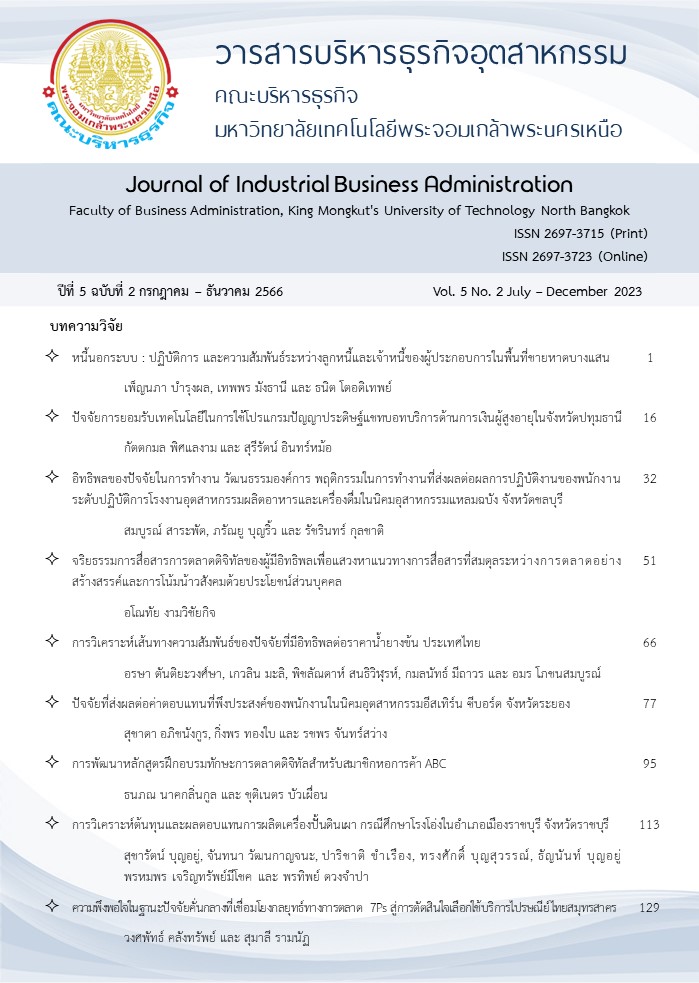Digital Marketing Communication Ethics of Influencers for Setting Communication Guideline to Balance between Creative Marketing Communication and Convincing Society for Personal Interest
Keywords:
Digital Marketing Communications, Ethics, Online InfluencersAbstract
This research aims to investigate the patterns of ethical and legal violations from case study of marketing communications through influencers occurring in Thailand and propose ethical guidelines for digital influencer marketing for Thai marketers based on a qualitative study via digital media. The researcher collected data specifically from 10 case studies, which were selected based on the criteria that the influencer marketing communications were legally infringing and caused damage between the years 2018-2023. The results revealed five patterns of ethical violations, including: enticing followers towards illegal products, persuading followers to use counterfeit or substandard products, deceiving followers to purchase or invest in false products, manipulating decisions of vulnerable groups, and misleading or defaming individuals that lead to societal divisions. The guidelines for ethical digital influencer marketing involve four key stakeholders: online influencers, digital marketers, professional associations and governmental agencies, and consumers. All stakeholders should collaboratively support ethical digital influencer marketing practices for sustainable marketing that benefits consumers in society.
References
Borchers, N. S., & Enke, N. (2022). “I've never seen a client say:‘Tell the influencer not to label this as sponsored’”: An exploration into influencer industry ethics. Public relations review, 48(5), 102235.
Bogle, A. (2017). Social media influencers, it’s time to be truthful about your# ads. Mashable. Retrieved from https://mashable.com/article/australia-advertising-instagram-influencers
Brown, D., & Fiorella, S. (2013). Influence marketing: How to create, manage, and measure brand influencers in social media marketing. Que Publishing.
Brown, D., & Hayes, N. (2008). Influencer marketing. Elsevier.
Chaudhry, R., & Sharma, A. (2018). Ethical issues in digital marketing-A review. ITIHAS-The Journal of Indian Management, 8(1). 10-18.
Creswell, J. W., & Poth, C. N. (2016). Qualitative inquiry and research design: Choosing among five approaches. Sage publications.
Duffy, B. E. (2017). (Not) getting paid to do what you love: Gender, social media, and aspirational work. Yale University Press.
Eagle, L., & Dahl, S. (2015). Marketing ethics & society. Sage.
Electronic Transactions Development Agency. (2020). Thailand Internet User Behavior 2020. Retrieved from https://www.etda.or.th/th/Useful-Resource/publications/Thailand-Internet-User-Behavior-2020.aspx
Kozinets, R. V. (2015). Netnography: redefined. Sage.
Smit, C. R., Buijs, L., Van Woudenberg, T. J., Bevelander, K. E., & Buijzen, M. (2020). The impact of social media influencers on children’s dietary behaviors. Frontiers in psychology, 10, 2975.
Sweeney, E., Lawlor, M. A., & Brady, M. (2022). Teenagers’ moral advertising literacy in an influencer marketing context. International Journal of Advertising, 41(1), 54-77.
von Mettenheim, W., & Wiedmann, K. P. (2022, May). Hate Speech and Bad Language: The Ugly Face of Social Influencers and Its Impact on Brands: An Abstract. In Academy of Marketing Science Annual Conference (pp. 291-292). Cham: Springer Nature Switzerland.
Wellman, M. L., Stoldt, R., Tully, M., & Ekdale, B. (2020). Ethics of authenticity: Social media influencers and the production of sponsored content. Journal of Media Ethics, 35(2), 68-82.
WorkpointToday. (2022, 18 March). The Act prohibits advertising of liquor and beer small brand dies Big brands don't grow up. Retrieved from https://workpointtoday.com/explaine-alcohol/. [In Thai]
กรุงเทพธุรกิจ. (2565, 25 มีนาคม). บทสรุปโฆษณาดิจิทัลปี 64 การเติบโตเกินคาด 18% Facebook กุมเงิน 1 ใน 3 ของตลาด. สืบค้นวันที่ 27 พฤษภาคม 2565 จาก https://www.bangkokbiznews.com/ business/995574
นัฐพงษ์ สุขประเสริฐ และปรีชา คำมาดี. (2563). ผู้ทรงอิทธิพลจริยธรรมทางการตลาดของผู้ทรงอิทธิพลในโลกออนไลน์: จริยธรรมทางการตลาดของผู้ทรงอิทธิพลทางความคิด. วารสารวิทยาการจัดการปริทัศน์, 22(1), 213-222.
ภีรกาญจน์ ไค่นุ่นนา. (2559). Netnography: ระเบียบวิธีวิจัยเพื่อแสวงหาความจริงในชุมชนและ วัฒนธรรมออนไลน์แห่งยุคโพสต์โมเดิร์น. Journal of Social Sciences and Humanities Research in Asia, 22(2), 1-17.
อโณทัย งามวิชัยกิจ. (2564). การตลาดดิจิทัล. MarketingEverywherebyAnothai.
Downloads
Published
How to Cite
Issue
Section
License
Copyright (c) 2023 Journal of Industrial Business Administration

This work is licensed under a Creative Commons Attribution-NonCommercial-NoDerivatives 4.0 International License.



